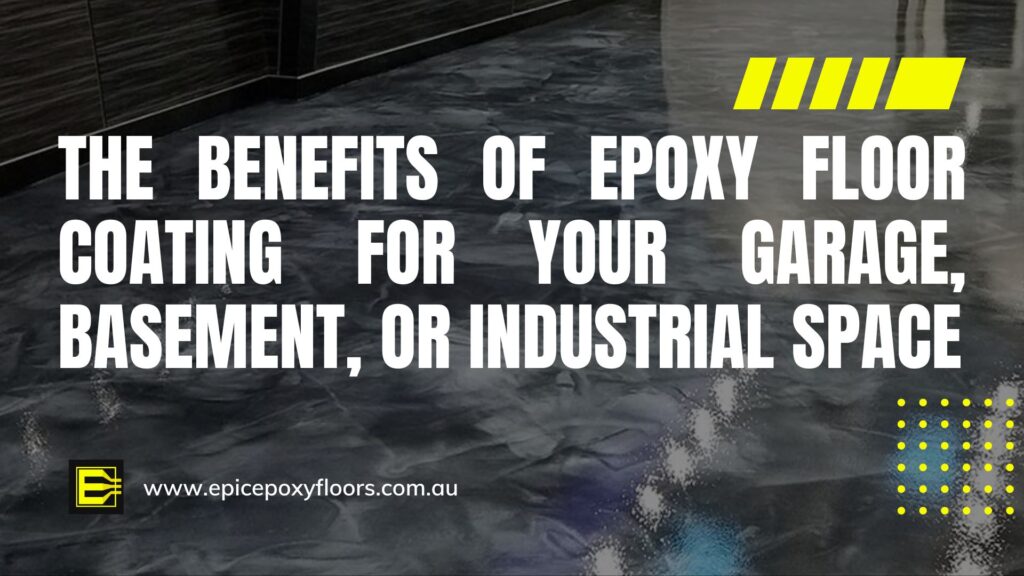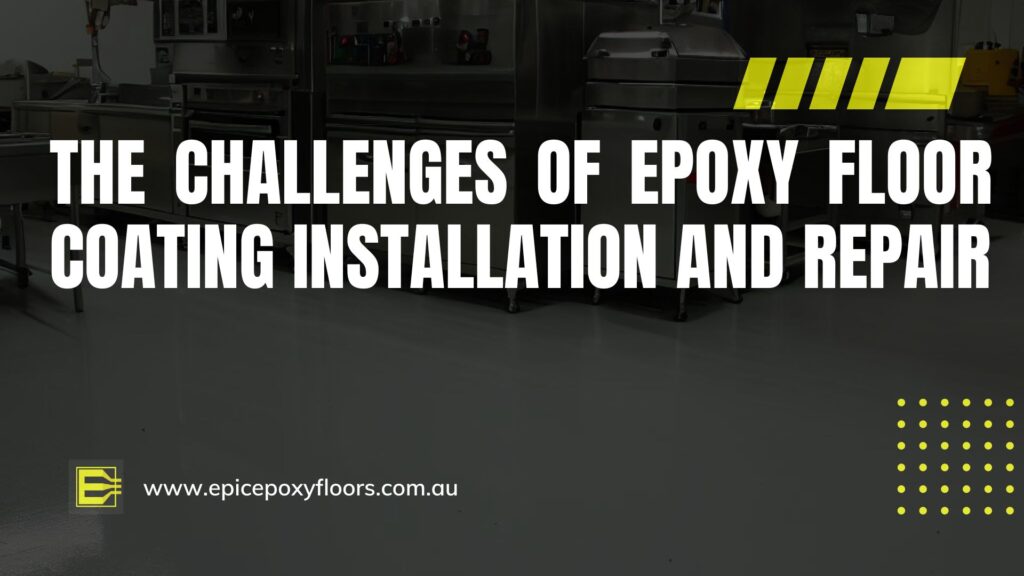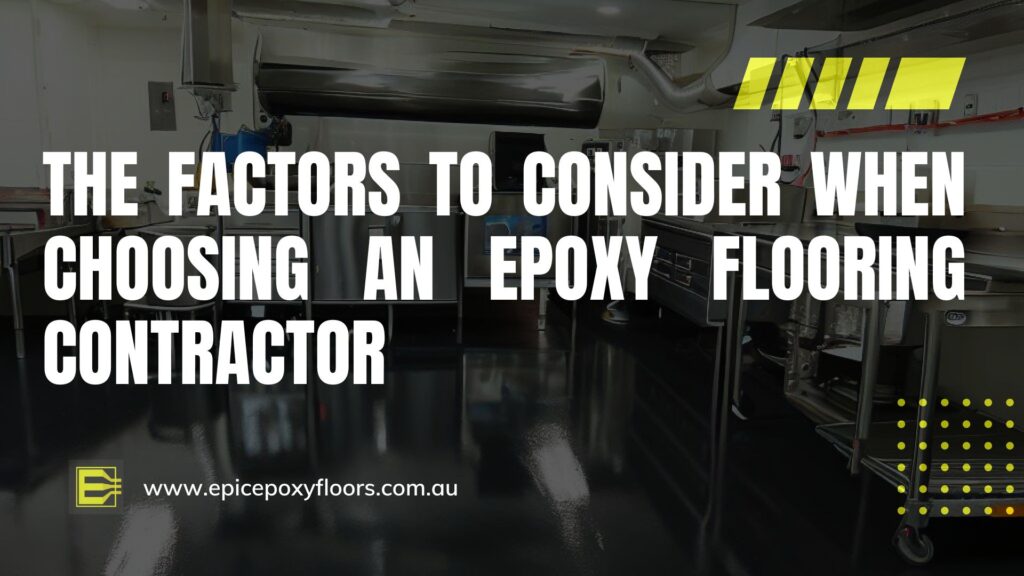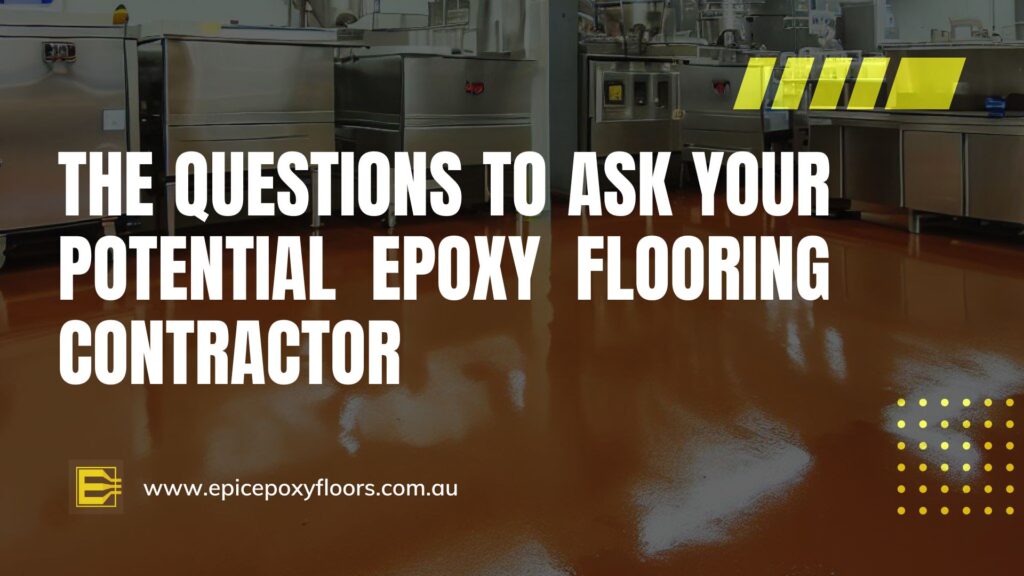What is Epoxy Floor Coating and Why Do You Need It?
Epoxy floor coating is a type of coating that is applied over concrete or other types of floors to create a smooth, durable, and attractive surface. Epoxy floor coating is often used in garages, basements, warehouses, and industrial settings by an epoxy flooring contractor because of its resistance to stains, chemicals, and abrasion. It also repels water and reduces slipperiness, perfect for high-traffic areas.
If you are looking for a way to improve the appearance and functionality of your floor, epoxy floor coating may be the solution you need. Epoxy floor coating can protect your floor from damage, enhance its aesthetic appeal, and make it easier to clean and maintain. However, epoxy floor coating also requires careful installation and repair, which means you need to hire a professional epoxy flooring contractor who can do the job right.

The Benefits of Epoxy Floor Coating for Your Garage, Basement, or Industrial Space
Protection and Durability
One of the main benefits of epoxy floor coating is that it provides a strong and resilient layer of protection for your floor. Epoxy floor coating can withstand heavy loads, impacts, scratches, and spills without cracking, chipping, or peeling. It can also resist heat, moisture, mold, and bacteria, making it ideal for harsh environments. Epoxy floor coating can extend the lifespan of your floor and save you money on repairs and replacements.
Aesthetics and Customization
Another benefit of epoxy floor coating is that it can transform the look of your floor and match your personal style. Epoxy floor coating comes in a variety of colors, patterns, and finishes that can create different effects on your floor. You can choose from solid colors, metallic flakes, quartz chips, or even custom designs that suit your taste and preference. Epoxy floor coating can also add a glossy shine to your floor that reflects light and brightens up your space.
Easy Maintenance and Cleaning
A third benefit of epoxy floor coating is that it makes your floor easy to maintain and clean. Epoxy floor coating creates a seamless and non-porous surface that prevents dirt, dust, oil, grease, and other contaminants from penetrating or accumulating on your floor. You can simply wipe or sweep your floor with a damp cloth or mop to keep it clean and sanitary. Epoxy floor coating also eliminates the need for waxing or polishing your floor, saving you time and effort.

The Challenges of Epoxy Floor Coating Installation and Repair
Surface Preparation and Application
One of the challenges of epoxy floor coating installation and repair is that it requires proper surface preparation and application. Before applying epoxy floor coating, the epoxy flooring contractor has to remove any existing coatings, sealers, or paints from your floor. They also have to repair any cracks, holes, or uneven areas on your floor. Then they have to clean and degrease your floor to ensure a good bond between the epoxy and the concrete. Applying epoxy floor coating also requires skill and speed, as the epoxy resin and hardener have to be mixed in the right proportions and applied quickly before they harden. Any mistakes or imperfections during the installation process can affect the quality and appearance of the final result.
Curing Time and Temperature
Another challenge of epoxy floor coating installation and repair is that it depends on the curing time and temperature of the epoxy. Curing is the process of hardening and drying of the epoxy after it is applied to the floor. The curing time and temperature vary depending on the type and thickness of the epoxy used. Generally, epoxy floor coating takes about 24 hours to cure at room temperature. However, if the temperature is too low or too high, the curing process may be slowed down or sped up, which can cause problems such as bubbles, cracks, or discoloration on the epoxy surface. Therefore, it is important to choose an epoxy floor coating contractor who can control the curing conditions and ensure a smooth finish.
Cracking, Chipping, and Peeling
A third challenge of epoxy floor coating installation and repair is that it may crack, chip, or peel over time due to various factors. Although epoxy floor coating is durable and resistant to most damages, it may still suffer from some wear and tear due to heavy impacts or temperature changes. For example, if you drop a heavy object on your epoxy floor or expose it to extreme heat or cold, it may cause cracks or chips on the epoxy surface. Moreover, if the epoxy was not properly applied or cured in the first place, it may peel off from the concrete substrate due to poor adhesion. Repairing epoxy floor coating can be challenging and expensive, as you may need to remove and replace the entire damaged section.

The Factors to Consider When Choosing an Epoxy Flooring Contractor
License and Insurance of Epoxy Flooring Contractor
One of the factors to consider when choosing an epoxy flooring contractor is their license and insurance. A license shows that the contractor has the necessary qualifications, training, and experience to perform epoxy floor coating services. It also shows that they follow the local codes and regulations for safety and quality standards. An insurance shows that the epoxy flooring contractor has the financial protection and liability coverage in case of any accidents, injuries, or damages that may occur during or after the project. You should always ask for proof of license and insurance from your potential epoxy floor coating contractor and verify their validity with the relevant authorities.
Experience and Reputation of Epoxy Flooring Contractor
Another factor to consider when choosing an epoxy flooring contractor is their experience and reputation. Experience shows that the contractor has the knowledge and skills to handle different types of epoxy floor coating projects, such as residential, commercial, or industrial. It also shows that they have the ability to deal with various challenges and complications that may arise during or after the project. Reputation shows that the epoxy flooring contractor has a track record of delivering satisfactory results and meeting customer expectations. It also shows that they have a good relationship with their previous clients and suppliers. You should always check the portfolio and testimonials of your potential epoxy floor coating contractor and ask for references from their past projects.
Material and Equipment Quality used by Epoxy Flooring Contractor
A third factor to consider when choosing an epoxy flooring contractor is their material and equipment quality. Material quality shows that the contractor uses high-quality epoxy products that are suitable for your floor type, condition, and purpose. It also shows that they use epoxy products that are safe, eco-friendly, and long-lasting. Equipment quality shows that the contractor uses modern and advanced tools and machines that can ensure a smooth and efficient application of epoxy floor coating. It also shows that they use equipment that is well-maintained, calibrated, and cleaned to avoid any malfunctions or errors during or after the project. You should always ask about the source and specifications of the epoxy products and equipment that your potential epoxy floor coating contractor uses and inspect them before hiring them.
Warranty and Guarantee Proposed by Epoxy Flooring Contractor
A fourth factor to consider when choosing an epoxy flooring contractor is their warranty and guarantee policy. A warranty shows that the contractor stands behind their workmanship and quality of service. It also shows that they are willing to fix any defects or problems that may occur within a certain period of time after the project completion. A guarantee shows that the contractor promises to deliver the desired outcome and meet your specific requirements. It also shows that they are confident in their abilities and performance. You should always ask about the terms and conditions of the warranty and guarantee policy of your potential epoxy floor coating contractor and get them in writing before hiring them.

The Questions to Ask Your Potential Epoxy Flooring Contractor
How long have you been in business and how many projects have you completed?
This question helps you assess the experience and expertise of your potential epoxy flooring contractor. You want to hire a contractor who has been in business for a long time and has completed many projects similar to yours. This way, you can be sure that they have the knowledge and skills to handle your project professionally and efficiently.
What type of epoxy floor coating do you use and why?
This question helps you understand the material quality and suitability of your potential epoxy flooring contractor. You want to hire a contractor who uses high-quality epoxy products that are appropriate for your floor type, condition, and purpose. You also want to hire a contractor who can explain the benefits and drawbacks of different types of epoxy products, such as solid colors, metallic flakes, quartz chips, or custom designs.
How do you prepare the surface and apply the coating?
This question helps you evaluate the surface preparation and application process of your potential epoxy floor coating contractor. You want to hire a contractor who follows the proper steps for preparing and applying epoxy floor coating, such as removing existing coatings, repairing cracks, cleaning and degreasing, mixing and pouring, spreading and leveling, curing and sealing. You also want to hire a contractor who can demonstrate their skills and techniques for applying epoxy floor coating smoothly and evenly.
How long will the project take and what are the possible complications?
This question helps you estimate the timeline and budget of your project with your potential epoxy floor coating contractor. You want to hire a contractor who can complete your project within a reasonable time frame without compromising on quality or safety. You also want to hire a contractor who can anticipate any potential complications or delays that may occur during or after the project, such as weather conditions, curing issues, cracking problems, or customer satisfaction.
How much do you charge and what is included in the price?
This question helps you compare the price and value of your potential epoxy flooring contractor. You want to hire a contractor who offers a fair and competitive price for their service without any hidden fees or charges. Also want to hire a contractor who provides a detailed breakdown of what is included in their price, such as labor, materials, equipment, transportation, and taxes. Always ask for a written estimate and a contract before hiring an epoxy floor coating contractor.
Can you provide references and samples of your previous work?
This question helps you verify the experience and reputation of your potential epoxy flooring contractor. You want to hire a contractor who can provide you with references and samples of their previous work that are relevant to your project. Then, you should contact their references and ask them about their satisfaction level, quality of service, and overall experience with the contractor. You should also check their samples and see if they match your expectations and preferences.

Conclusion: Epoxy Flooring is a Great Investment for Your Space, but Only if You Hire the Right Epoxy Flooring Contractor
Epoxy floor coating is a type of coating that can protect your floor from damage, enhance its aesthetic appeal, and make it easy to maintain and clean. However, epoxy floor coating also requires careful installation and repair, which means you need to hire a professional epoxy floor coating contractor who can do the job right. To choose the best epoxy flooring contractor for your project, you should consider their license and insurance, experience and reputation, material and equipment quality, warranty and guarantee policy, and price and value. You should also ask them some questions to evaluate their skills and performance. By following these tips, you can find the perfect epoxy flooring contractor for your project and enjoy the benefits of epoxy floor coating for years to come.
We hope this article helps you with your website blog. If you have any questions or feedback, feel free to contact us.

